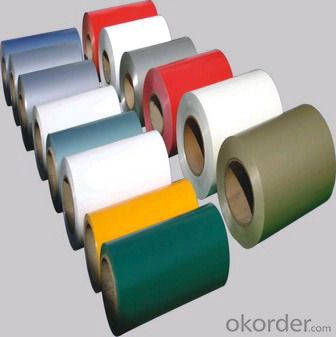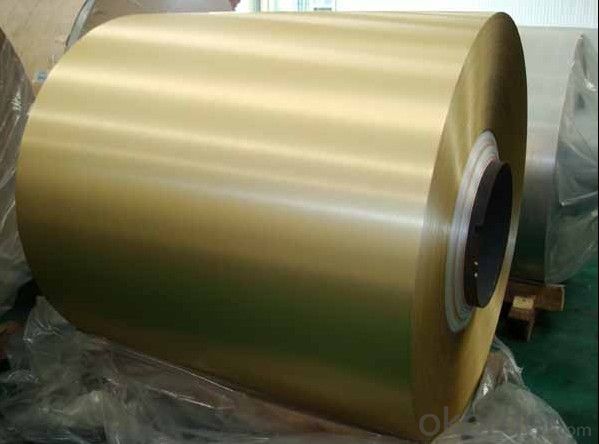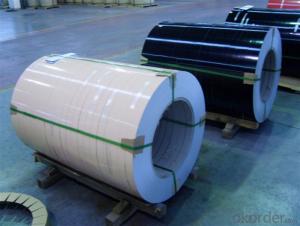RAL 8003 PE 18 Micros Coated Aluminium Coil
- Loading Port:
- Shanghai
- Payment Terms:
- TT OR LC
- Min Order Qty:
- 2 m.t.
- Supply Capability:
- 50000 m.t./month
OKorder Service Pledge
OKorder Financial Service
You Might Also Like
Item specifice
Description
Standard | GB/T3190-2008, GB/T3880-2006, ASTM B209, JIS H4000-2006 .etc |
Thickness | 0.2-8.0 mm aluminium 7075 t6 |
Width | 1250mm 1000mm 1219mm or as your requirements |
MOQ | 2 Ton |
Package | Standard export package, by wooden box or as required. |
Application | 1060 is widely used in the strength requirements of the product. Products commonly used in signs, billboards, building exterior decoration, bus body, high factory wall decoration, kitchen sink, lamp, fan, electronic components, chemical apparatus, sheet processing, deep drawing or spinning hollow ware, welding parts, heat exchangers, Bell surface and plate, plates, kitchen utensils, accessories, safety equipment and other. |
Technical data
1060 aluminum Chemical composition | ||||||||
Al | V | Cu | Mg | Zn | Mn | Ti | Fe | |
99.6 | 0.05 | 0.05 | 0.03 | 0.05 | 0.03 | 0.03 | 0.35 | |
1060 aluminum Mechanical properties | ||||||||
Tensile strength(σb (MPa) | elongationδ10 (%) | |||||||
110-136 | 3%-5% | |||||||


PE and PVDF Painting
Polyester Coatings (PE)
PE (polyester) coatings exhibit an excellent combination of hardness, flexibility, flow, appearance, and superior resistance to dirt retention in indoor and outdoor applications. These coatings are highly resistant to abrasion, metal marking, staining, and marring, and require minimal maintenance. Glazetech uses polyester paints which provide excellent colour and gloss retention properties.
Polyvinylidene Fluoride Coatings (PVDF)
PVDF (polyvinylidene fluoride) is a chemical resistant thick film barrier coating commonly used in architectural applications where both excellent appearance and substrate protection must be maintained over a long period of time. This coating is unaffected by most chemicals and solvents and has excellent wear and abrasion resistance. PVDF also has a high dielectric strength, excellent resistance to weathering and the ability to self extinguish.
- Q:What is the typical thickness of an aluminum coil?
- The typical thickness of an aluminum coil can vary depending on its intended use and application. However, in general, aluminum coils range in thickness from 0.006 inches (0.15 mm) to 0.25 inches (6.35 mm). Thinner aluminum coils are often used for lightweight applications such as packaging materials, while thicker coils are commonly used in construction, automotive, and aerospace industries where strength and durability are essential. It is important to note that the specific thickness requirements may vary based on the specific needs and specifications of the project or product being manufactured.
- Q:Can aluminum coils be used in marine applications?
- Yes, aluminum coils can be used in marine applications. Aluminum is a corrosion-resistant metal that provides excellent durability and strength, making it suitable for various marine environments. It is commonly used in boat building, marine equipment, and other marine applications due to its lightweight nature and resistance to saltwater corrosion.
- Q:Can aluminum coils be used in the manufacturing of lighting fixtures?
- Yes, aluminum coils can be used in the manufacturing of lighting fixtures. Aluminum is a lightweight and durable material that is commonly used in various industries, including the lighting industry. It offers excellent heat dissipation properties, making it suitable for fixtures that generate heat, such as LED lights. Additionally, aluminum coils can be easily shaped and molded into different designs, making them a versatile choice for lighting fixture production.
- Q:What is the typical yield strength-to-density ratio for aluminum coils?
- The yield strength-to-density ratio of aluminum coils can vary depending on the specific grade of aluminum being used. However, compared to many other metals, aluminum generally possesses a relatively high strength-to-density ratio. This characteristic allows it to exhibit good mechanical properties while maintaining a lightweight nature. For instance, the commonly utilized grade of aluminum for coils, known as 3003 aluminum, usually demonstrates a yield strength-to-density ratio of approximately 0.53 MPa•m^3/kg. In simpler terms, this means that for every unit of density (mass per unit volume), the material can endure roughly 0.53 megapascals (MPa) of stress before undergoing permanent deformation. There are also other high-strength aluminum alloys, including 5052 or 6061, which can possess even greater yield strength-to-density ratios, reaching up to 0.6 MPa•m^3/kg or higher. These alloys are frequently employed in applications that demand enhanced strength and durability, like those found in the aerospace or automotive industries. All in all, the yield strength-to-density ratio of aluminum coils is typically quite advantageous, rendering aluminum a popular choice for a wide array of applications that necessitate both strength and lightweight properties.
- Q:Can aluminum coils be used for HVAC systems?
- Yes, aluminum coils can be used for HVAC systems. Aluminum coils are commonly used in HVAC systems as they offer several advantages over other coil materials. Firstly, aluminum is a lightweight material, which makes it easier to handle and install. This can result in lower installation costs and reduced strain on the structure of the HVAC system. Secondly, aluminum coils have excellent heat transfer properties. They efficiently transfer heat from the refrigerant to the surrounding air, which is crucial for the effective functioning of the HVAC system. Aluminum coils also have a high resistance to corrosion, which is particularly important in humid environments or areas with high levels of pollutants. Additionally, aluminum is a highly recyclable material, making it an environmentally friendly choice for HVAC systems. It can be easily recycled and reused, reducing the need for new material extraction and minimizing waste. Overall, aluminum coils are a reliable and efficient choice for HVAC systems, providing excellent heat transfer, durability, and environmental sustainability.
- Q:I was wondering if you could mold clay into a sphere then fill it with aluminum. Then put it over a fire and wait until the aluminum melts then put it in a freezer and it would come out as a sturdy, aluminum sphere. Thanks!
- Do not try this at home! Seriously, this is exactly the kind of process that is used for casting metals. However, you need to have very strong molds with no cracks in them. Also, aluminum presents special problems. Solid aluminum does not corrode the way iron does, because it very quickly forms a protective tough layer of aluminum oxide. But molten aluminum can catch fire, with devastating consequences.
- Q:I have heard that aluminum may be a contributing agent in causing Alzheimer's disease, and that if we drink from aluminum cans, that we get aluminum into our system from them. It seems like this would be pretty easy to test in a laboratory, whether or not there are aluminum particles in the contained beverage. But I have heard or read that the inside of the cans are coated with something. So is this just typical uninformed rumors from the Internets, or is there anything to it? Hate to sound rude, but I am not really interested in opinions, like Well I don't think they would sell them if... or Oh yes, I think you get lots of aluminum from it. I am only interested in facts, not gut feelings or opinions.
- It's a fact that the cola industry controls us through microchips floating in their drinks
- Q:Can aluminum coils be used for food processing conveyor systems?
- Yes, aluminum coils can be used for food processing conveyor systems. Aluminum is a durable and lightweight material that is resistant to corrosion, making it suitable for food processing environments. Additionally, aluminum is non-toxic and does not react with food, ensuring the safety and quality of the processed products.
- Q:What is the thickness tolerance of aluminum coils?
- The thickness tolerance of aluminum coils can vary depending on the specific grade and manufacturing process. Generally, the standard thickness tolerance for aluminum coils is around +/- 0.005 inches (+/- 0.13 mm). However, it is important to note that this tolerance can be further refined or adjusted based on the customer's specific requirements and the capabilities of the manufacturer. Some specialized aluminum coil manufacturers may offer even tighter thickness tolerances, typically around +/- 0.002 inches (+/- 0.05 mm), to meet more precise or demanding applications. It is always recommended to consult with the manufacturer or supplier to ensure the desired thickness tolerance is met for a particular project or application.
- Q:What are the common surface preparation methods for aluminum coils?
- Common surface preparation methods for aluminum coils include cleaning, degreasing, and etching. Cleaning is typically the first step in the surface preparation process for aluminum coils. This involves removing any dirt, dust, or other contaminants from the surface. Cleaning can be done using a variety of methods, such as using solvents, alkaline cleaners, or mechanical cleaning techniques like brushing or scrubbing. Degreasing is another important step in preparing aluminum coils. This helps to remove any oils or greases that may be present on the surface. Degreasing can be done using solvents or alkaline cleaners specifically designed for this purpose. It is essential to thoroughly remove any grease or oils, as they can interfere with subsequent treatments and coatings. Etching is often performed on aluminum coils to create a roughened surface, which improves adhesion for subsequent coatings or treatments. Etching can be done using chemical etchants or through mechanical methods such as sandblasting. The choice of etching method depends on the specific requirements of the application and the desired surface finish. After surface preparation, additional treatments may be applied to aluminum coils, such as conversion coatings or anodizing, to enhance corrosion resistance or improve surface properties. These treatments help to protect the aluminum surface and provide a base for further finishes or coatings. Overall, proper surface preparation is crucial for achieving good adhesion, corrosion resistance, and overall performance of aluminum coils in various applications. It ensures that the surface is clean, free from contaminants, and properly prepared for subsequent treatments or coatings.
1. Manufacturer Overview |
|
|---|---|
| Location | |
| Year Established | |
| Annual Output Value | |
| Main Markets | |
| Company Certifications | |
2. Manufacturer Certificates |
|
|---|---|
| a) Certification Name | |
| Range | |
| Reference | |
| Validity Period | |
3. Manufacturer Capability |
|
|---|---|
| a)Trade Capacity | |
| Nearest Port | |
| Export Percentage | |
| No.of Employees in Trade Department | |
| Language Spoken: | |
| b)Factory Information | |
| Factory Size: | |
| No. of Production Lines | |
| Contract Manufacturing | |
| Product Price Range | |
Send your message to us
RAL 8003 PE 18 Micros Coated Aluminium Coil
- Loading Port:
- Shanghai
- Payment Terms:
- TT OR LC
- Min Order Qty:
- 2 m.t.
- Supply Capability:
- 50000 m.t./month
OKorder Service Pledge
OKorder Financial Service
Similar products
New products
Hot products
Related keywords




























